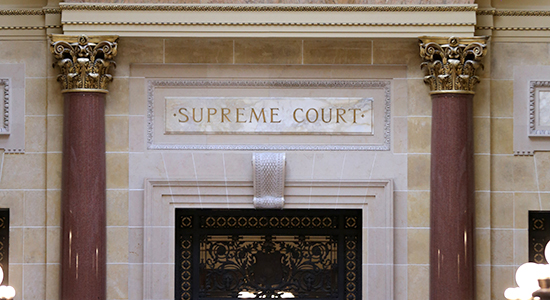
May 10, 2017 – The Wisconsin Supreme Court recently ruled that a former Walgreens employee is entitled to unemployment benefits, concluding the Labor Industry Review Commission (LIRC) incorrectly ruled that she did not qualify based on substantial fault.
In Operton v. LIRC, 2017 WI 46 (May 4, 2017), the supreme court unanimously affirmed an appeals court ruling that reversed and set aside LIRC’s decision, which had concluded that multiple “errors” by a worker amounted to substantial fault.
While the supreme court unanimously ruled that the former Walgreens employee was entitled to unemployment benefits despite inadvertent errors, a majority opinion and three concurring opinions touched on a “hot button” issue that is likely to reappear.
Three justices signaled a desire to reconsider whether Wisconsin courts should grant any deference to agency interpretations of Wisconsin statutes, noting the practice as a “judicial creation that circumvents the court’s duty to say what the law is. …”
Substantial Fault
Wisconsin unemployment insurance benefits are available to individuals who do not engage in “misconduct,” including deliberate violations of company policy.
In 2013, the Wisconsin Legislature added a second tier that bars unemployment benefits to workers who were at “substantial fault” in their own termination.
Under Wis. Stat. section 108.04(5g), substantial fault includes “acts or omissions of an employee over which the employee exercised reasonable control and which violate reasonable requirements of the employee's employer but does not include:
One or more minor infractions of rules unless an infraction is repeated after the employer warns the employee about the infraction.
One or more inadvertent errors made by the employee.
Any failure of the employee to perform work because of insufficient skill, ability, or equipment.”
Lela Operton worked for Walgreens during a two-year period, handling more than 80,000 cash transactions during that period. Walgreens terminated her employment due to multiple cash-handling errors that resulted in monetary losses to Walgreens.
 Joe Forward, Saint Louis Univ. School of Law 2010, is a legal writer for the State Bar of Wisconsin, Madison. He can be reached by email or by phone at (608) 250-6161.
Joe Forward, Saint Louis Univ. School of Law 2010, is a legal writer for the State Bar of Wisconsin, Madison. He can be reached by email or by phone at (608) 250-6161.
In one instance, Operton took a WIC check for more items than the check authorized, resulting in a $2.89 loss. In other instances, she accepted a check without a customer’s signature, accepted a check before its valid date, returned a check to the customer instead of retaining it, and inadvertently placed a check in the customer’s bag.
Two of her final violations involved accepting a credit card without checking ID (it was stolen), and allowing a customer to leave the store without completing a transaction.
In terminating Operton’s employment, Walgreens indicated that Operton’s errors were not intentional or malicious, but that she failed to improve despite multiple warnings. When Operton applied for unemployment benefits, Walgreens contested.
An administrative law judge for the Department of Workforce Development concluded that Operton was at substantial fault in her termination because she had reasonable control over her actions and continued to make errors resulting in company losses.
LIRC affirmed. In affirming LIRC, the circuit court deferred completely to LIRC’s interpretation of the substantial fault provision of the unemployment law. But the appeals court ruled that LIRC’s interpretation was owed no deference.
Reviewing de novo, the appeals court concluded that Operton was entitled to unemployment benefits because the legislature “statutorily determined that an employee does not lose their unemployment benefits for making unintentional errors.”
Majority Opinion
Chief Justice Patience Roggensack wrote a majority opinion, joined by four other justices. Because LIRC “did not provide an articulated interpretation of the statute” in determining whether Operton was entitled to unemployment benefits, Chief Justice Roggensack asserted that the agency deference issue was “of no consequence.”
Roggensack interpreted section 108.04(5g) independently to conclude that Operton was terminated for “one or more inadvertent errors,” which does not amount to substantial fault. LIRC noted that Operton’s errors were not intentional, Roggensack noted.
“Operton’s eight cash-handling errors were not so egregious as to warrant the conclusion that the errors were transformed from inadvertent to reckless or intentional under the facts of this case,” wrote the chief justice, noting that Operton made eight errors while handling about 80,000 transactions over the course of 21 months.
“Consequently, as a matter of law, Operton’s errors are the type of conduct the legislature intended to exempt from substantial fault,” Chief Justice Roggensack wrote.
Concurrences
Justice Shirley Abrahamson wrote a concurring opinion, joined by Justice Ann Walsh Bradley, concluding that Operton is entitled to unemployment benefits.
However, who wrote separately to assert that this is a “no deference” case and Roggensack’s majority opinion “injects extra-statutory considerations into its analysis.”
Abrahamson said the majority opinion errs to the extent that it suggests prior employer warnings play into the inadvertent error analysis, or that multiple inadvertent errors could at some point, in their cumulative effect, rise to the level of substantial fault.
“I agree with Judge [Paul] Lundsten’s concurrence in the court of appeals: “[T]he statute tells us that, if all we have is repeated … ‘inadvertent errors,’ we do not have ‘substantial fault,’” Justice Abrahamson wrote.
Justice Rebecca Bradley, joined by Justices Michael Gableman and Daniel Kelly, joined the majority opinion but wrote separately to question whether the state constitution actually allows that courts should grant deference to agency interpretations of statutes.
“The doctrine of deference to agencies’ statutory interpretation is a judicial creation that circumvents the court’s duty to say what the law is and risks perpetuating erroneous declarations of the law,” Justice R. Bradley wrote.
“Because the court fulfills its interpretive duty, I join the majority opinion but urge the court to reconsider its decades-long abdication of this core judicial function.”
